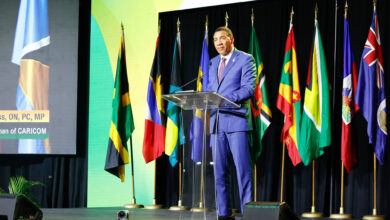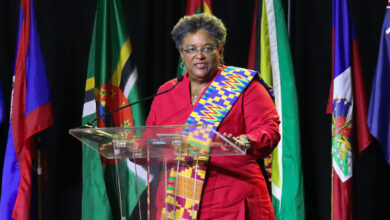Heads of Government of the Caribbean Community (CARICOM) met in Port-of-Spain, Trinidad and Tobago, for the Tenth Special Meeting 8-9 November 2004, pursuant to the decision of the Conference at its Twenty-Fifth Regular Meeting at Grand Anse, Grenada in July 2004 to convene a Special Meeting to discuss progress towards the establishment of the CARICOM Single Market and Economy (CSME), including realising the Single Market targets by 2005. They declared their resolve to advance the regional integration movement as a vehicle for the economic and social development of all Member States, their peoples and the CARICOM Region as a whole.
Heads of Government remain convinced of the logic of the CSME, its embodiment of the essence of a mature economic integration enterprise and its potential for unleashing the entrepreneurial spirit that is inherent in the Caribbean people, for stimulating the productive sectors of Member States, for increasing productivity within such sectors and for building a Caribbean architecture of economic independence, sustained economic growth and social cohesion.
In this context, Heads of Government reviewed the status of implementation in each Member State towards the 2005 timeline agreed in 2002 – and fast tracked by the decision of Heads of Government at their Fourteenth Inter-Sessional Meeting in 2003, to 2004 for Barbados, Jamaica and Trinidad and Tobago – for the removal of restrictions. Those States committed to meeting the 2004 timeline are on track for achieving this. Those on target for 2005 will be able to do so with some technical assistance and facilitation by the CARICOM Secretariat. Legal amendments have been prepared and submitted to each Member State so that the legislative process can be completed.
A realistic assessment of the implementation of the CSME by Member States indicates that overall, the core measures relating to the establishment of the Single Market would be in place by December 2005.
Key elements to complement the removal of restrictions on the free movement of goods, services, capital and skilled CARICOM nationals include the financing of the CSME Work Programme and the establishment and operationalising of the Development Fund for Disadvantaged Countries, Regions and Sectors. The Conference mandated the Council for Finance and Planning (COFAP) to agree on a financing mechanism for approval of the Conference at its July 2005 Meeting. The Development Fund it was agreed, is essential to enable small states to liberalise their markets without undue dislocation and must be in place by 2005.
The Conference agreed that it was time to expand the categories of CARICOM nationals who have the right to free movement within the Community beyond the five stated professional categories – graduates, media workers, artistes, musicians and sportspersons – taking into consideration the call from the labour movement for the inclusion of additional categories of workers. The Lead Head with responsibility for Labour and Free Movement of Skills will work with a Task Force to develop proposals for the consideration of the Council for Human and Social Development (COHSOD) and a submission to Heads of Government in time for their July 2005 Meeting.
Heads of Government, accepting that it is the role of Governments to provide the enabling environment for the growth of economic activity, recognise that non-State actors have an important role to play in the promotion of the CSME agenda. To this end, they mandate that non-State stakeholders such as the private sector, labour, consumers and NGOs, be provided with the information they need to be properly advised and equipped to capitalise on the opportunities as well as prepare for the challenges consonant with the creation and implementation of the CSME.
Private sector presentations at the Meeting highlighted the fact that despite incompletion of the process towards the full implementation of the CSME, the Single Market is creating an enabling environment for the successful cross-border operations of business and, in particular, financial services enterprises. This provides further impetus for the completion of the work to create the CSME.
The Heads of Government remain convinced that at all times it must be borne in mind, as a central focus of the CSME, that its ultimate aim is a marked improvement in the quality of life of the people of the Community.
They share the view that the success of the CSME will not be complete until the people of the Caribbean come to feel that they own the process and accept their responsibility for ensuring its success, recognising that their individual and collective advancement is intrinsically linked with the regional economic integration project. Heads of Government welcome the undertaking by Barbados to fund the Worker Education component of a renewed Public Education Programme and agree that 2005 be declared the Year of the Single Market.
They note that the Single Market has laid the platform for the progression to the Single Economy. They share the view that movement from the Single Market to the Single Economy constitutes an advance beyond market arrangements to the establishment of the environment for competitive production in the Region. To this end, Heads of Government agree to an indicative timeline of 2008 for the Single Economy and have mandated the preparation of a Regional Development Strategy in time for adoption at their Inter-Sessional Meeting In February 2005.
Heads of Government agree that the Tenth Special Meeting, held primarily to discuss and advance the progress towards the creation of the CSME, was a worthwhile and timely opportunity for a frank exchange of views and an important juncture at which to have taken stock of the efforts so far to create this new regional economic architecture.
The legislative work to be done, and the resolve of Member States and the administrative arm of the Caribbean Community should be infused with new energy to embark on the next leg of the journey towards the CSME. This is a journey that will involve a process of fundamental harmonised liberalisation and the adoption of a strategy for the economic repositioning of CARICOM to achieve sustainable growth and continued improvement in the lives of our Caribbean citizens.





